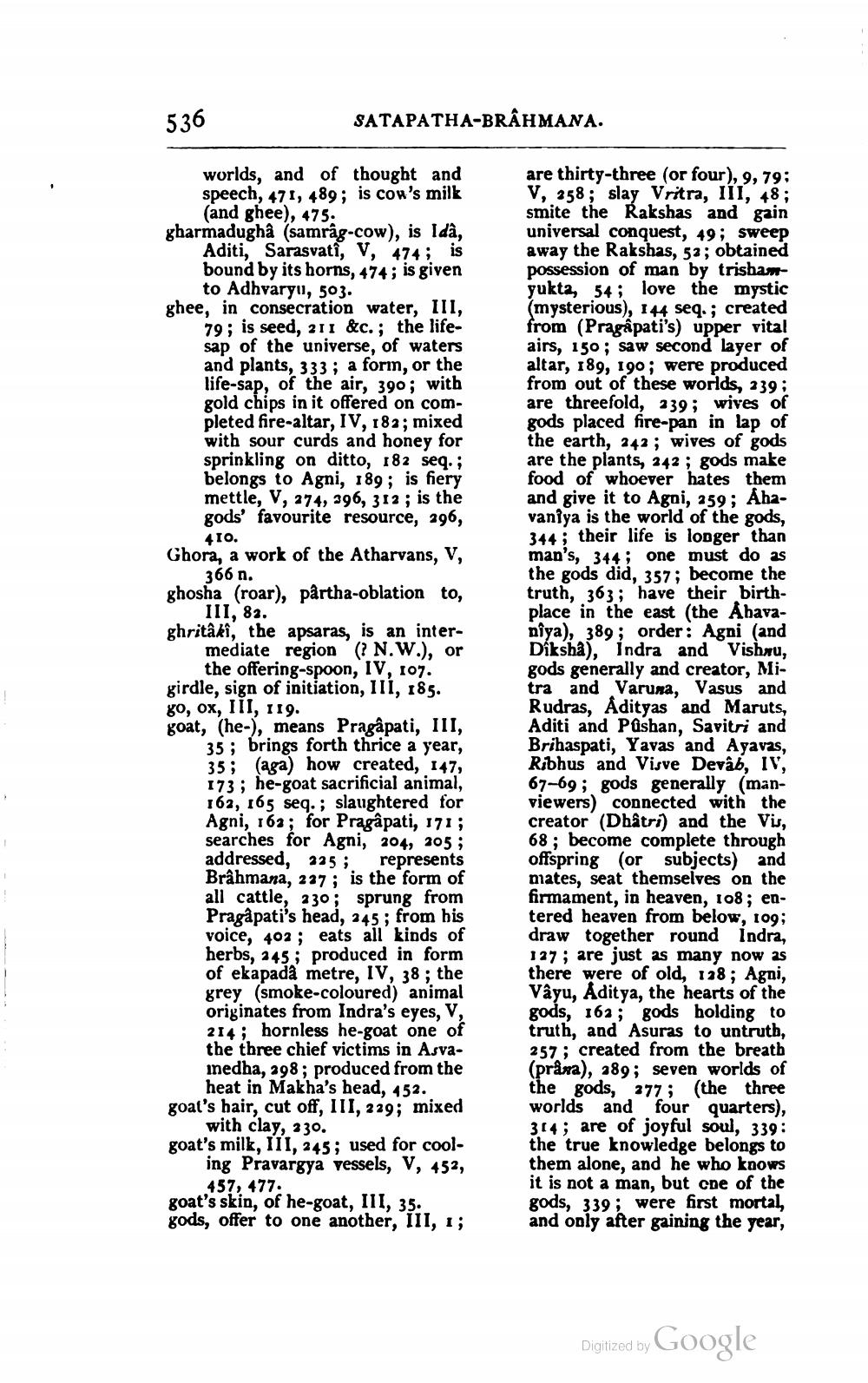________________
536
SATAPATHA-BRAHMANA.
410.
worlds, and of thought and speech, 471, 489; is cow's milk
(and ghee), 475. gharmadugha (samråg-cow), is Idâ,
Aditi, Sarasvati, v, 474 ; is bound by its horns, 474; is given
to Adhvaryu, 503. ghee, in consecration water, III,
79; is seed, 211 &c.; the lifesap of the universe, of waters and plants, 333 ; a form, or the life-sap, of the air, 390; with gold chips in it offered on completed fire-altar, IV, 182; mixed with sour curds and honey for sprinkling on ditto, 182 seq. ; belongs to Agni, 189; is fiery mettle, V, 274, 396, 312; is the
gods' favourite resource, 296, Ghora, a work of the Atharvans, V,
366 n. ghosha (roar), pârtha-oblation to,
III, 82. ghritâki, the apsaras, is an inter
mediate region (? N.W.), or
the offering-spoon, IV, 107. girdle, sign of initiation, III, 185. go, ox, III, 119. goat, (he-), means Pragậpati, III,
35; brings forth thrice a year, 35; (aga) how created, 147, 173 ; he-goat sacrificial animal, 162, 165 seq.; slaughtered for Agni, 162; for Pragâpati, 171; searches for Agni, 204, 205 ; addressed, 225; represents Brâhmana, 237 ; is the form of all cattle, 230; sprung from Pragàpati's head, 245; from his voice, 402; eats all kinds of herbs, 245 ; produced in form of ekapadá metre, IV, 38; the grey smoke-coloured) animal originates from Indra's eyes, V, 214; hornless he-goat one of the three chief victims in Asvainedha, 298; produced from the
heat in Makha's head, 452. goat's hair, cut off, III, 229; mixed
with clay, 230. goat's milk, 111, 245; used for cool
ing Pravargya vessels, V, 452,
457, 477. goat's skin, of he-goat, III, 35. gods, offer to one another, III, 1;
are thirty-three (or four), 9, 79; V, 258; slay Vritra, III, 48; smite the Rakshas and gain universal conquest, 49; sweep away the Rakshas, 52; obtained possession of man by trishamyukta, 54 ; love the mystic (mysterious), 144 seq. ; created from (Pragåpati's) upper vital airs, 150; saw second layer of altar, 189, 190; were produced from out of these worlds, 239; are threefold, 239; wives of gods placed fire-pan in lap of the earth, 242; wives of gods are the plants, 242 ; gods make food of whoever hates them and give it to Agni, 259; Ahavaniya is the world of the gods, 344; their life is longer than man's, 344; one must do as the gods did, 357; become the truth, 363; have their birthplace in the east (the Abavaniya), 389; order: Agni (and Diksha), Indra and Vishnu, gods generally and creator, Mitra and Varuna, Vasus and Rudras, Adityas and Maruts, Aditi and Pushan, Savitri and Brihaspati, Yavas and Ayavas, Ribhus and Visve Devâb, IV, 67-69; gods generally (manviewers) connected with the creator (Dhâtri) and the Vis, 68; become complete through offspring (or subjects) and mates, seat themselves on the firmament, in heaven, 108; entered heaven from below, 109; draw together round Indra, 127; are just as many now as there were of old, 138; Agni, Vâyu, Aditya, the hearts of the gods, 161; gods holding to truth, and Asuras to untruth, 257; created from the breath (pråra), 189; seven worlds of the gods, 377; (the three worlds and four quarters), 314; are of joyful soul, 339: the true knowledge belongs to them alone, and he who knows it is not a man, but cne of the gods, 339; were first mortal, and only after gaining the year,
Digitized by Google




